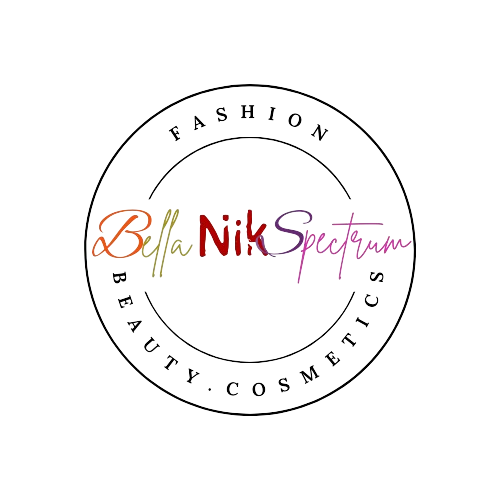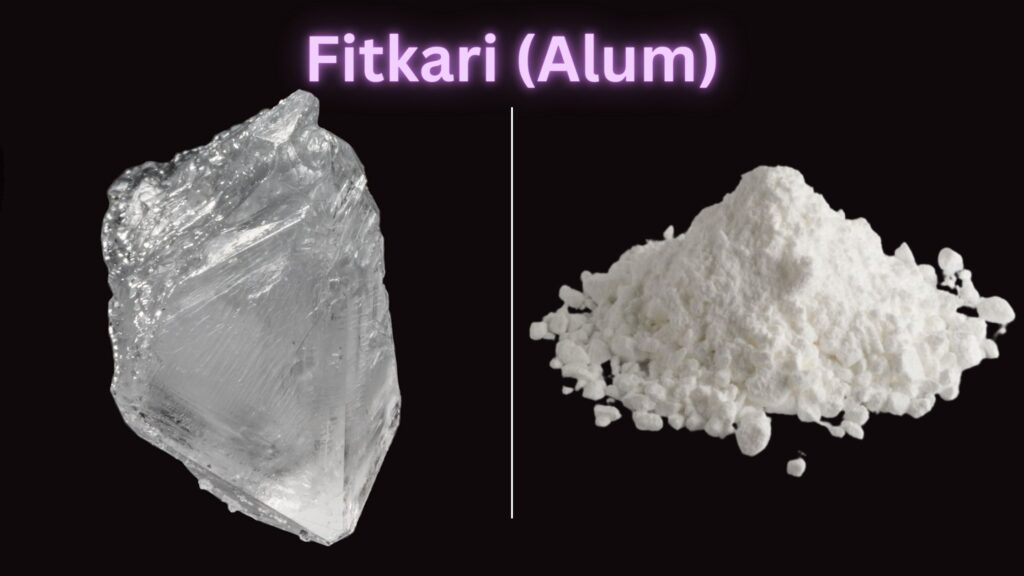
Fitkari (Alum): Introduction
Fitkari, sometimes known as alum, is a naturally occurring substance that has been used for years in both industry and domestic areas due to its wide range of uses. Potassium aluminum sulfate, a chemical compound with many applications and varieties, is the main component of this amazing material. Fitkari’s value has been consistently shown by cultures both ancient and modern.
It has always been essential to the purification of water. It has proven to be extremely useful in maintaining clean drinking water due to its capacity to bind to contaminants and remove them from suspension. This characteristic of Fitkari is very helpful in places with limited access to clean water. Fitkari is added to water during the coagulation process, where it bonds with impurities to make them heavy enough to sink to the bottom and leave clear water on top. The generations-long use of this straightforward but efficient technique demonstrates Fitkari’s staying power.
People commonly add Fitkari to their skincare and personal care routines because of its astringent characteristics, which extend beyond purifying water. Its natural astringency helps treat small wounds and cuts, tighten the skin, and minimize wrinkles. Various cultures use Fitkari as an aftershave due to its calming and restorative qualities. Additionally, its ability to address pigmentation and lighten skin tone makes it a highly sought-after component in many cosmetic formulations.
People can also use Fitkari for dental treatment. Its antibacterial and anti-inflammatory properties make it useful for maintaining dental hygiene. Gargling with a basic alum and water solution helps strengthen gums and prevent dental cavities. Because of its natural properties, many people still widely recommend and use this traditional medicine.
The industrial sector uses Fitkari for tanning leather, dyeing textiles, and producing paper. Its capacity to bind with both organic and inorganic compounds makes it an important tool in these procedures. Its broad range of applications includes use as a food ingredient and in baking powders.
Fitkari continues to be popular, but many still find it to be easily available and economically priced. It is available to them in a variety of forms, including powder, stones, and liquid solutions, both locally and online. Even though the price varies depending on the kind and quantity, most people consider it to be reasonable.
Because of its various benefits and uses, people still view fitkari, also known as alum, as vital in daily life. Its affordability and effectiveness ensure that it will remain important, whether people use it for skincare, dental care, industrial uses, or water purification. People may take full advantage of this amazing mineral by learning about the various types of fitkari and how to use them. This makes alum a great addition to any home or business.
| Website | Product Buying Link |
| Flipkart | https://fktr.in/Iady5xU |
Fitkari (Alum): History & Origin
Ancient cultures have used Fitkari for a long time. Scientifically, people know it as potassium aluminum sulfate. The word ‘alum’ comes from the Latin word ‘alumen,’ which translates to ‘bitter salt.’ Its name reflects the astringent and bitter taste of this chemical, which people have known and used for ages.
Ancient Civilizations
The ancient Egyptians originally used Fitkari in 1500 BCE. They valued alum for its capacity to filter water and its role as a drier during the mummification procedure. The ancient Egyptians also used alum to dye textiles, which helped fix the dyes and produce bright, long-lasting colors.
Many different businesses in ancient Rome relied on alum as an essential ingredient. When the Romans discovered how effective alum was at purifying water, they extensively employed it to maintain clean, clear water in their public baths. Additionally, the tanning and dyeing industries used alum. Roman chroniclers such as Pliny the Elder documented its application, emphasizing its significance in daily life and trade.
Medieval Period
During the Middle Ages in Europe, people started to value alum more. Its main sources were in the East, particularly the area surrounding Constantinople (present-day Istanbul) and the Aegean Sea island of Lesbos. The alum trading routes greatly benefited the economy, and people hotly disputed control over these routes.
During this period, people extracted and produced alum in more advanced ways. Venice, a well-known Italian city, controlled the alum trade and used it for its vast textile industry. Recognizing the economic significance of the alum trade, the Florence Medici family also became engaged in it.
Renaissance and Early Modern Period
During the Renaissance, European scientists and alchemists further developed their knowledge and application of alum. They studied its qualities in greater detail, and its uses expanded beyond the usual ones. Alum was used to make paper and ink, and it eventually became an essential component of the expanding printing industry.
In the 15th century, explorers discovered major alum reserves at Tolfa, Italy. This discovery led to the construction of alum factories, significantly reducing Europe’s dependency on Eastern suppliers. The Papal States, particularly under Pope Pius II, profited from these deposits, turning alum into a considerable source of income.
Modern Era
In the current period, the manufacturing and use of fitkari have become more industrialized. Chemical advances have led to the identification of many forms of alum (such as potash alum, ammonium alum, and chrome alum) and the development of specific applications for each form. In the 18th and 19th centuries, industries widely used alum in the textile industry, water purification, and even the growing field of medicine.
Nowadays, manufacturers mass-produce fitkari and make it readily available in various forms, such as powder, crystals, and liquid solutions. Its applications have expanded to include industries such as cosmetics, food processing, and pharmaceuticals. Modern scientific understanding has also led to the development of more efficient and environmentally friendly techniques for producing alum.
Fitkari (Alum): Cultural Significance
Fitkari maintains cultural significance in various parts of the world. For example, in India, people commonly use fitkari in traditional medicine (Ayurveda) and everyday life. They often use it in rituals and festivals for its cleansing effects.
Fitkari (Alum): Types
There are several types of fitkari, each with unique chemical compositions and uses:
- Potash Alum (Alumbre Stone): People commonly use it for water treatment.
- Ferric alum is used in dyeing and water treatment operations.
- White Alum: It is known for its cleanliness and application in cosmetics.
- Ammonium alum is often used in the cosmetic and pharmaceutical sectors.
- Chrome Alum: It is used for tanning and photography.
- Sodium Alum: It is used in baking powders and as an additive in food preparation.
Fitkari (Alum): Uses With Steps
For skin whitening
- combine 1 teaspoon of powdered fitkari with 2 tablespoons of water.
- Apply the mixture to your face or the affected regions using a cotton ball.
- Leave it on for 10 to 15 minutes.
- Wash with lukewarm water.
- To achieve the best effects, repeat 2-3 times per week.
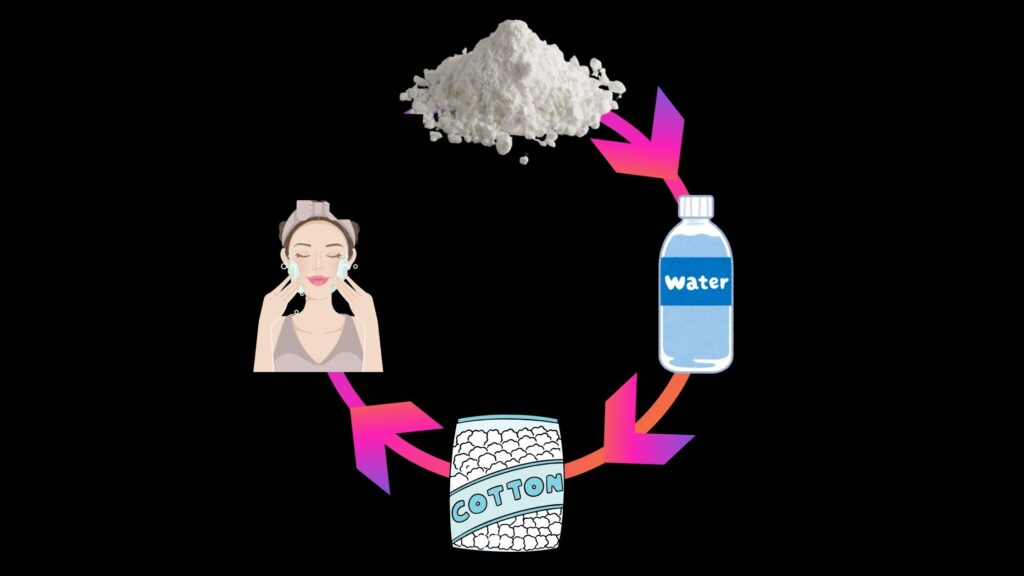
For dark underarms
- Dissolve 1 teaspoon of powdered fitkari in 1 cup of lukewarm water.
- Apply the solution to the underarms with a cotton ball.
- Leave it on for around 10–15 minutes.
- Wash well with water.
- Use it daily to see major improvements.
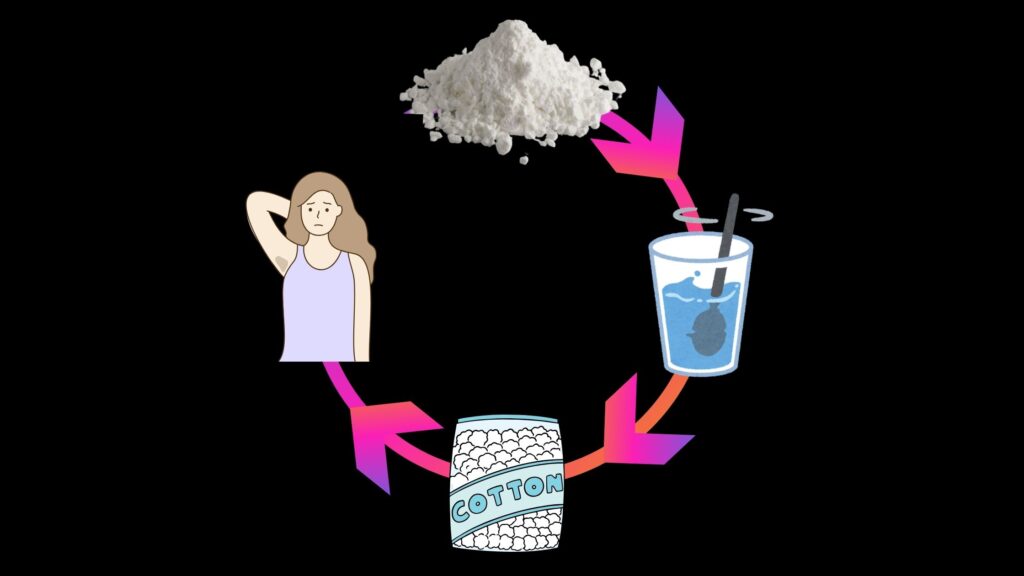
For deodorant and antibacterial
- Apply water to a piece of fitkari crystal.
- After finishing your shower, gently rub it into your underarms.
- Let it dry naturally.
- Use it daily to keep your body smelling fresh.

For Skin Tanning
- Combine 1 teaspoon of powdered fitkari with 2 tablespoons of yogurt.
- Apply the mixture to the tanned areas.
- Allow it to remain on for 20 minutes.
- Wash well with lukewarm water.
- Use it twice a week to reduce tan.
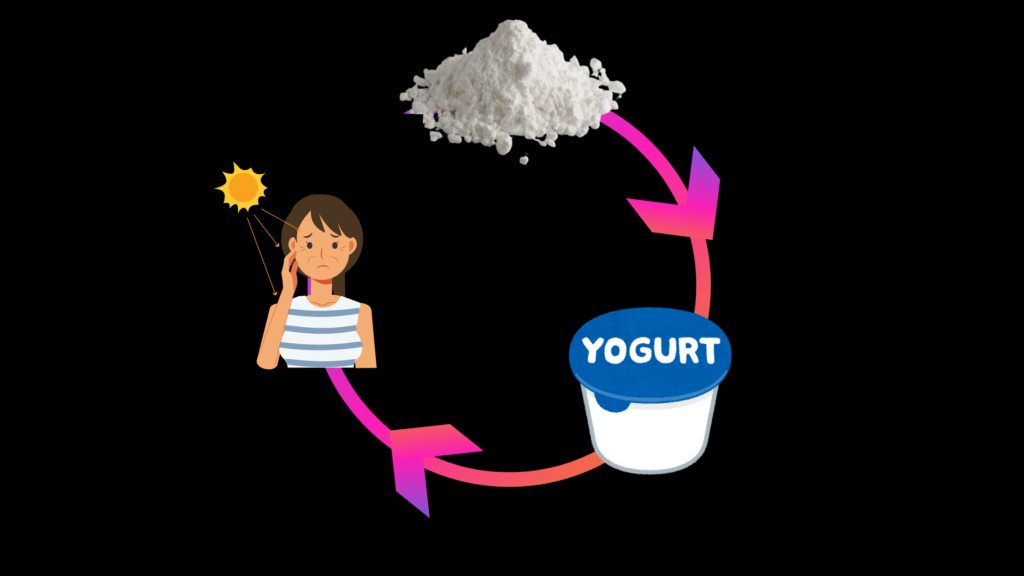
For Face Mask
- Combine 1 teaspoon of powdered fitkari with 2 tablespoons of rose water.
- Apply the paste evenly throughout your face.
- Leave it on for around 15–20 minutes.
- Wash well with lukewarm water.
- Use it once a week for softer and younger skin.
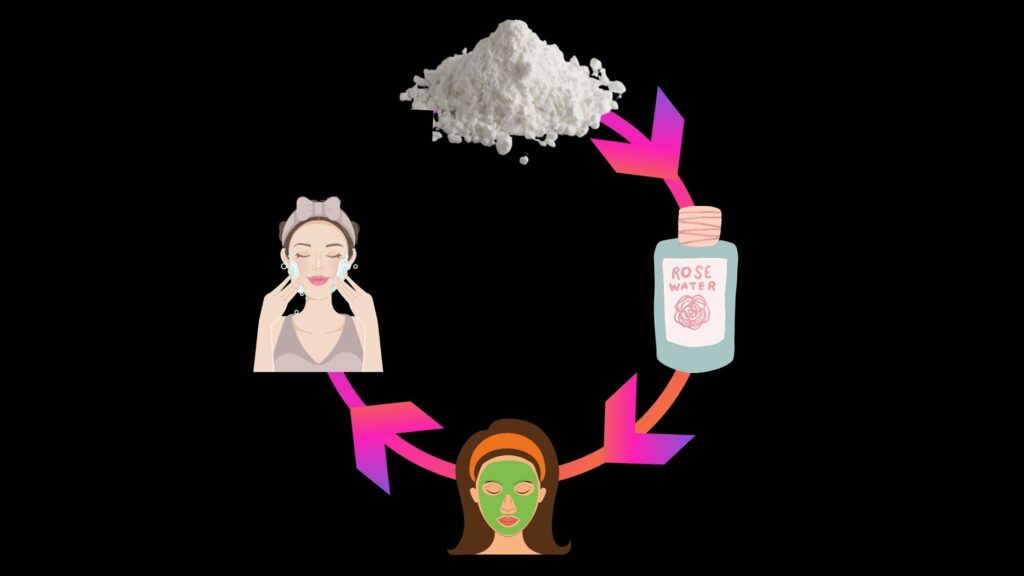
For Aftershave
- Wet a piece of Fitkari crystal.
- After shaving, gently massage it all over your face and neck.
- Leave it on for a few minutes.
- If desired, wash thoroughly with cold water.
- Apply it after each shave to soothe and disinfect the skin.
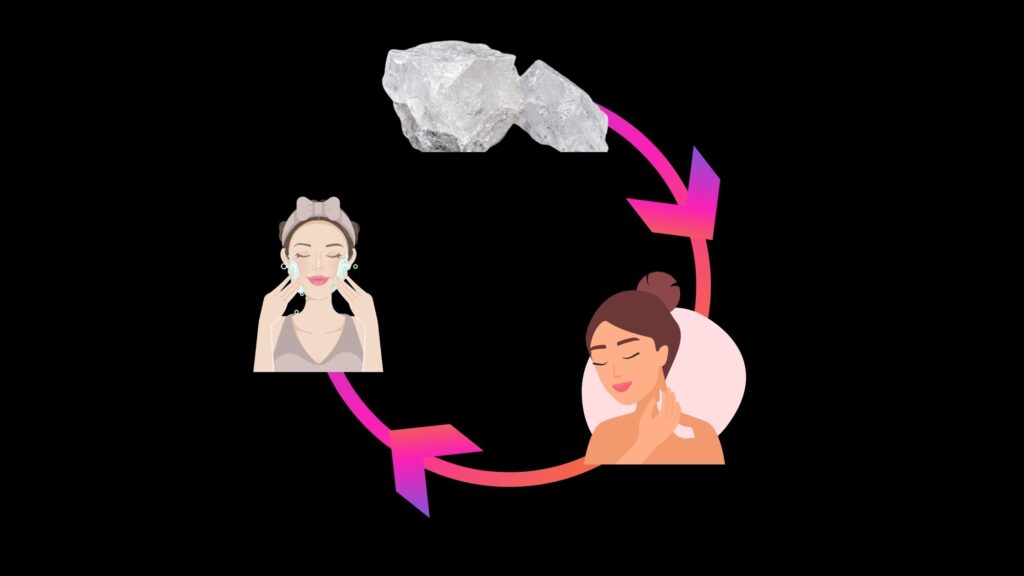
For Face-Pimple
- Combine 1/2 teaspoon of powdered fitkari with 1 tablespoon of water.
- Use a cotton swab to apply the solution to pimples.
- Allow it to stay on for 20 minutes.
- Wash well with water.
- Use it every day until the pimples disappear.
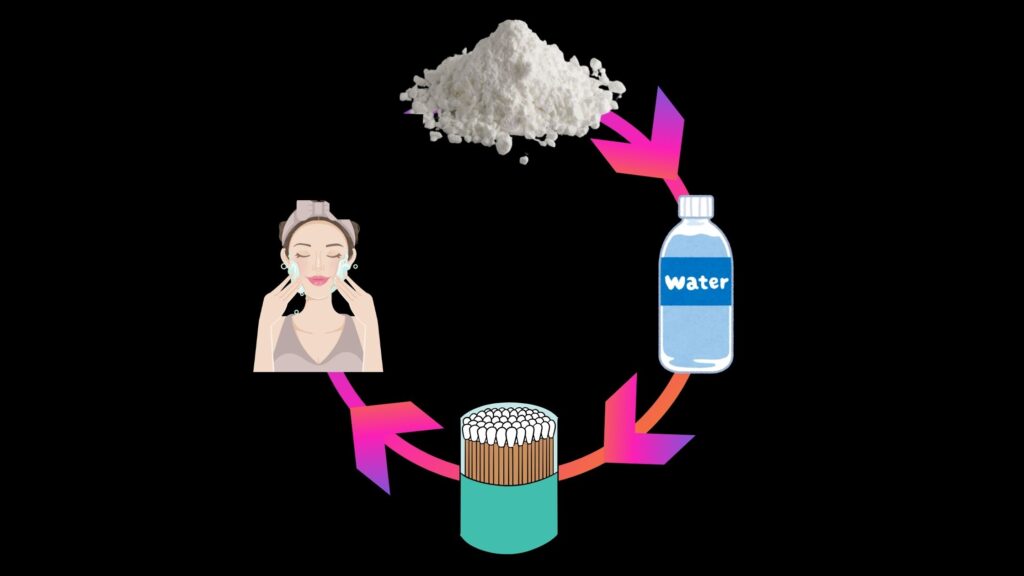
For Dark Circles and Blackheads
- Combine 1/2 teaspoon of powdered fitkari with 1 tablespoon of water.
- To treat dark circles, apply the solution around your eyes.
- Then apply the solution to areas with blackheads.
- Allow it to stay on for 15 minutes.
- Wash thoroughly with lukewarm water.
- Use it 2-3 times each week for best results.
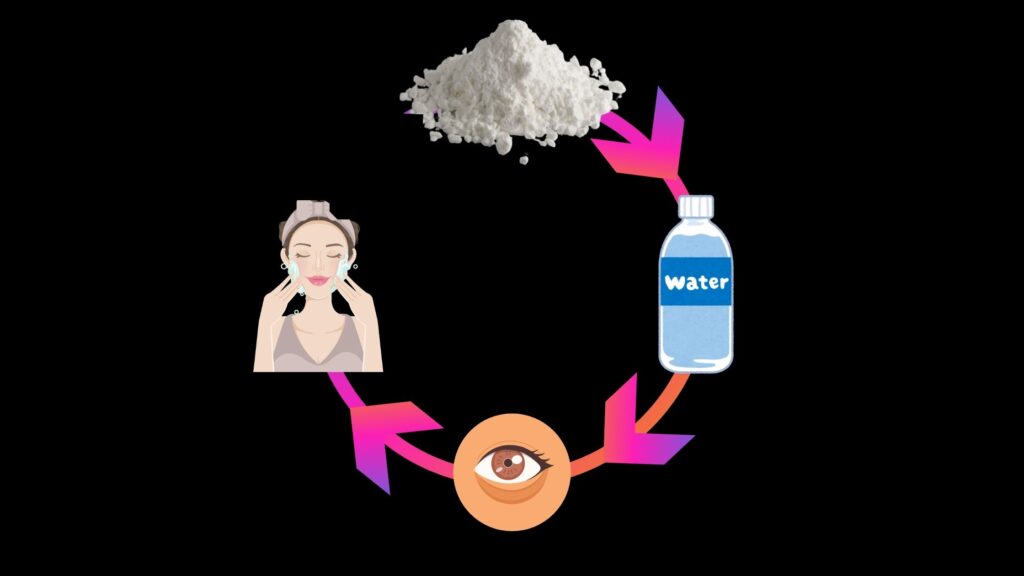
For skin tightening
- Mix 1 teaspoon of powdered fitkari with 2 tablespoons of water.
- Use a cotton ball to apply the solution to your face.
- Allow it to stay on for 10–15 minutes.
- Wash thoroughly with lukewarm water.
- Use it once a week to tighten your skin.
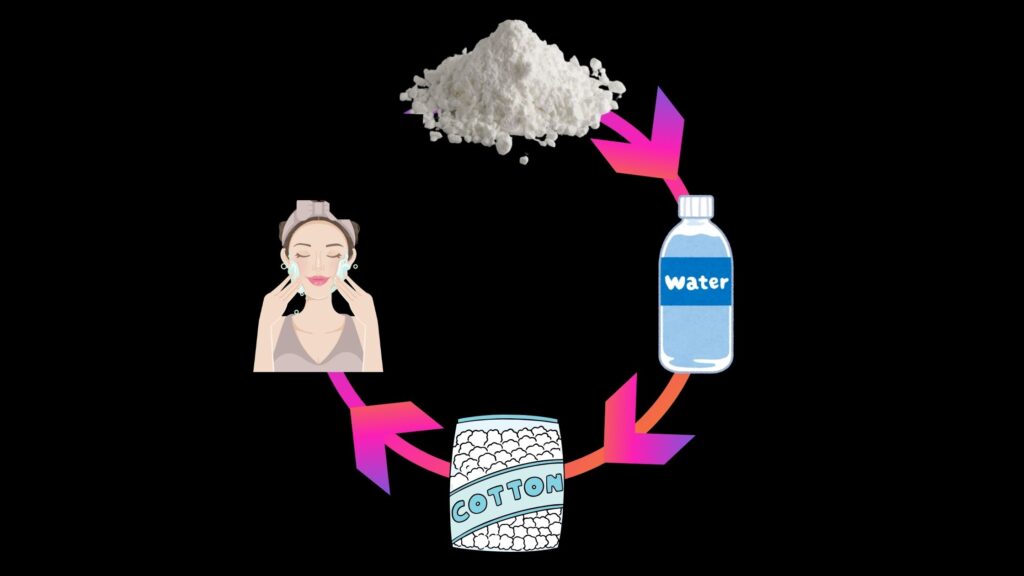
For Teeth
- Combine 1/2 teaspoon of powdered fitkari in a glass of water.
- Gargle with the solution for approximately 1-2 minutes.
- Spit out the solution and wash your mouth with water.
- Use it daily to maintain good oral hygiene.
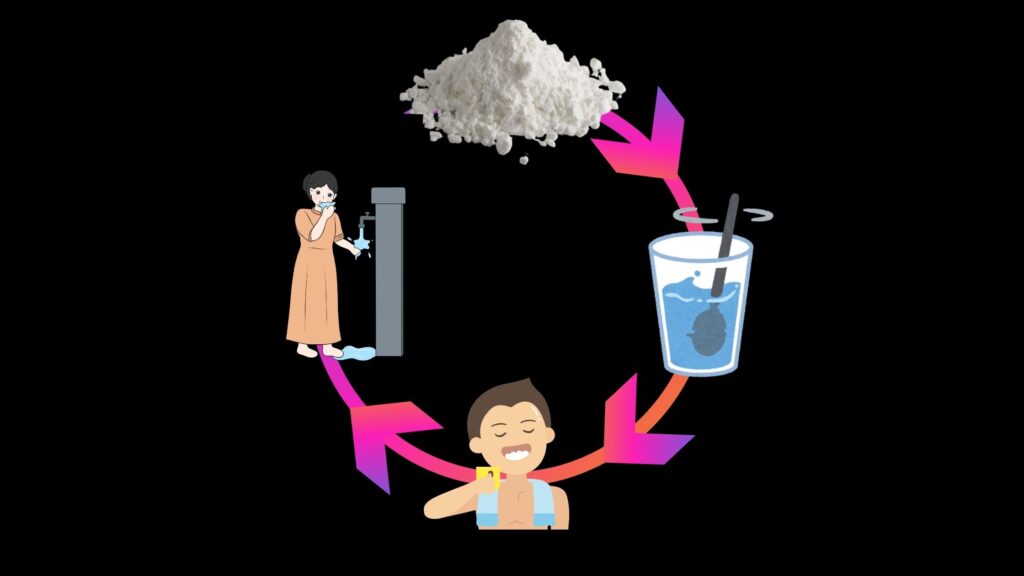
For Gums
- Add 1/2 teaspoon of powdered fitkari to a glass of lukewarm water.
- Gargle the solution for 1 to 2 minutes.
- Spit out the solution and rinse your mouth with water.
- Use it regularly to treat gum disease and inflammation.
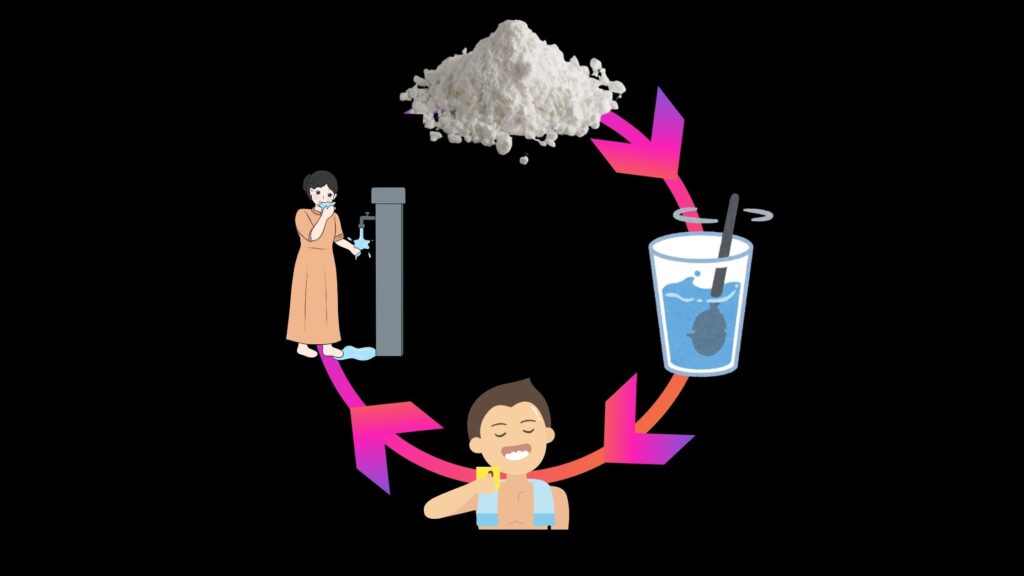
For hair dandruff
- Combine 1 teaspoon of powdered Fitkari with 1 cup of water.
- Massage the solution into your scalp gently.
- Allow it to stay on for 15–20 minutes.
- Wash thoroughly with a gentle shampoo.
- Use it twice a week to get rid of dandruff.
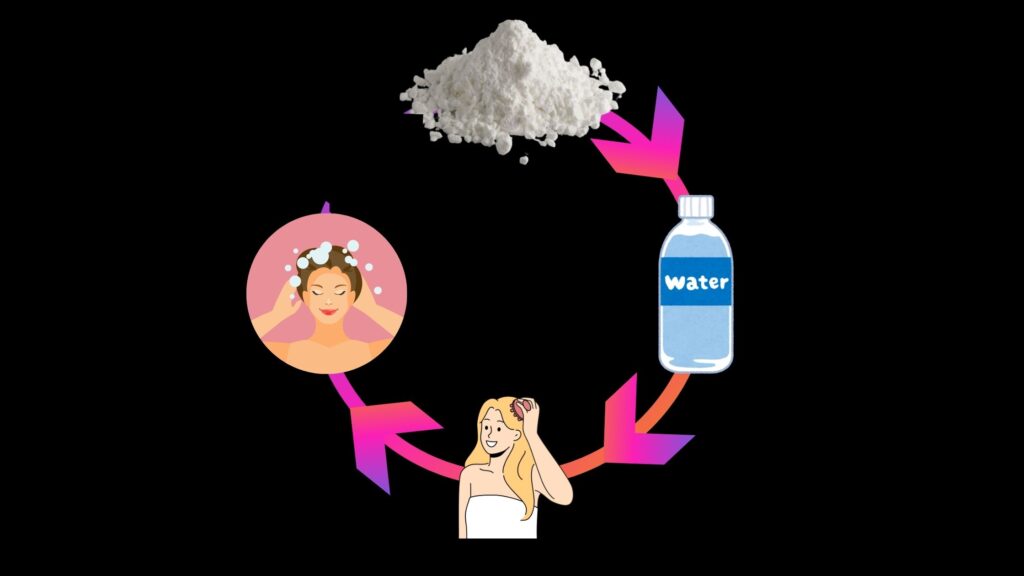
For water purification (drinking water)
- Mix 1 teaspoon of powdered fitkari with 1 liter of polluted water.
- Completely stir the solution.
- Allow the water to settle for 30 minutes.
- Impurities will separate and sink to the bottom.
- Carefully transfer the pure water to another container, leaving the impurities behind.
- Now you can drink this purified water.
Fitkari (Alum): Benefits
- Antibacterial Properties: Fitkari’s capacity to kill bacteria makes it effective in preventing infections and promoting hygiene.
- Astringent Properties: Its astringent properties help tighten skin, reduce wrinkles, and close pores.
- Cost-effective: Fitkari is cheap and widely available, making it an achievable remedy for many common problems.
- Versatility: Fitkari’s versatility is shown in its wide range of applications, including cosmetics, dental care, and water purification.
- Natural Remedy: As a natural ingredient, fitkari is a safer option than many chemical-based solutions.
Fitkari (Alum): Commercial Availability
You can find Fitkari widely available online and at local stores. It comes in various forms, including powder, stone, and liquid solutions. Prices vary based on the form and quantity, but it remains a cheap and readily available substance for daily use.
Fitkari (Alum): Chemistry and Safety
- Fitkari is safe and effective when used properly. It dissolves in water, making it suitable for various uses. To ensure safety and effectiveness, people must use the appropriate kind of alum for each application.
- Always do patch tests on the skin or use in limited quantities for the first time if you find good results then continue its use for the best results.
- Always moisturize the areas after use to prevent dryness, redness, and itching.
Fitkari (Alum): Conclusion
Fitkari is a strong, flexible chemical with numerous applications. It offers several benefits, including purifying water and enhancing skincare routines. By understanding its types, uses, and availability, you can maximize the benefits of this old but still relevant substance.
FAs
Fitkari, also known as alum, offers a wide range of applications due to its antibacterial, astringent, and coagulant qualities. Here are some of its uses are skin whitening,
Yes, you can use fitkari daily for some applications; however, use it appropriately and in moderation to avoid any negative effects.
Phitkari, also known as alum, offers numerous applications due to its antibacterial, astringent, and coagulant qualities. Here, some of its benefits are skin whitening, dark underarms, deodorants, skin tanning, face mask, shave, face pimples, dark circles, blackheads, skin tightening, teeth, gums, hair dandruff, water purification for drinking water, and many more.
Yes, you can use fitkari on hair, and it offers various benefits, especially for dandruff and scalp health.
When handled carefully and sparingly, phitkari / fitkari, also called alum, is generally safe for various uses.
Regularly using alum can be advantageous for some purposes, but proceed with caution and be aware of any negative effects. Read our blog to learn about some popular alum uses and daily usage needs.
People commonly use fitkari, also known as alum, for various applications due to its antibacterial, astringent, and coagulant qualities. While it offers many advantages, incorrect or excessive usage can result in various negative effects. Here are some potential negative effects of fitkari: skin irritation, dryness, allergic reactions, mouth irritation, eye irritation, and digestive problems.
Yes, you can drink water purified with alum, but you must follow certain processes to ensure safety. People commonly use alum in water treatment to purify drinking water by eliminating pollutants through coagulation. The usual dosage is 0.5 grams of alum per liter of water, but this might vary based on the amount of pollutants in the water.
Alum is generally safe for various applications when handled appropriately and in sufficient quantities. However, using it improperly or in huge doses can be dangerous.
Using fitkari on the face can help with various skin disorders, but it is not recommended for daily use due to the risk of dryness and irritation. Read our blog to learn in detail.
Alum is not a standalone hair removal remedy, but it can be used traditionally to aid in the hair removal process and to soothe the skin afterward.
Fitkari, also known as alum, is often praised for its various skin benefits, including its ability to brighten and lighten the skin. However, it is essential to understand the scope of these benefits, the proper methods of use, and any precautions to be taken.
You can use fitkari to tighten your skin by creating a simple toner or mask and applying it regularly.
Yes, girls can apply alum on their faces, but they should use it carefully and with precautions. Alum offers a variety of skin benefits, including antimicrobial qualities, skin tightening, and the ability to treat acne and blemishes.
Alum is not commonly used to remove tan from the skin. Its main benefits are its antimicrobial characteristics, ability to tighten the skin, and capability to treat acne and blemishes. However, some people may notice that alum improves skin tone and reduces the appearance of tan over time.
No, eating fitkari is not safe. Fitkari is primarily used in external applications such as skin care, water purification, and astringents. Consuming alum can be harmful to your health. It is important to keep fitkari away from food and avoid ingestion. If you have any health concerns or questions about using fitkari, consult a healthcare expert.
Alum and fitkari are commonly used interchangeably to refer to the same chemical, potassium aluminum sulfate. In Hindi it is known as “fitkari” whereas in English we called it “alum”.
Yes, alum can be beneficial for the underarms in various aspects, including its antibacterial characteristics, sweat reduction, and astringent effects.
Due to its astringent and antibacterial characteristics, several cultures have long used alum to promote dental health. However, modern dental practitioners do not generally promote its use due to potential risks and a lack of solid scientific data supporting its effectiveness.
Alum, also known as Fitkari, is considered to have astringent characteristics that can aid in skin tightening. Astringents are chemicals that cause tissues to shrink, producing an immediate tightening effect. However, the intensity and duration of this tightening effect vary depending on skin type, alum content, and individual response.
Aluminum, in its natural state as a metal, does not expire. When it comes to aluminum compounds like alum (potassium aluminum sulfate), there is no standard expiration date because they do not degrade or spoil over time. These compounds remain stable and can be stored indefinitely if kept dry, cold, and free from moisture and impurities.
Alum, also known as fitkari, is generally considered safe for topical application in moderation. However, excessive or incorrect usage of alum may result in negative side effects and reactions.
It’s generally not advisable to leave alum on your skin overnight, especially if you have sensitive or dry skin. While alum has astringent and antibacterial characteristics that can aid in skincare, prolonged application on the skin, such as overnight, may lead to adverse effects or irritation.
You can store fitkari at home in a cool, dry place away from direct sunlight and dampness. It is advisable to use an airtight container and keep it in a cool, dry location, ensuring childproof storage.
Phitkari, commonly known as alum, can be safely used on the face if applied carefully and in moderation. Its long history of use in various skincare applications is due to its astringent and antibacterial characteristics.
There is limited scientific evidence showing that Fitkari reduces hair growth. Fitkari is primarily recognized for its astringent and antibacterial characteristics, which are commonly used in skincare and personal hygiene products. However, its impact on hair growth is not fully known.
Hair growth is influenced by various factors including genetics, hormones, age, and overall health. Substances known to block hair growth are typically targeted treatments used in dermatology or cosmetology, such as prescription medications or laser therapy.
Fitkari is not commonly used for treating dark circles under the eyes. While its astringent and antibacterial characteristics can help the skin, its ability to reduce dark circles is limited. Dark circles are often caused by factors such as heredity, lack of sleep, stress, dehydration, allergies, and aging.
Yes, alum can help with pimples and acne due to its astringent and antibacterial characteristics. These qualities contribute to its effectiveness for acne-prone skin.
Fitkari has been used for a long time as an astringent and calming aftershave.
